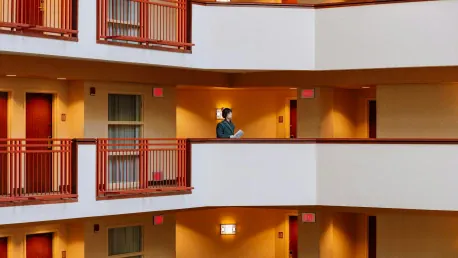Efforts to find sustainable solutions for asylum accommodations have seen the Home Office make significant strides in recent months. Recognizing the inefficacy and temporary nature of housing asylum seekers in hotels, the department has enacted a new strategy to transfer these individuals to more stable and manageable housing environments. The plan is particularly aimed at resolving longstanding issues born out of emergency measures, which have led to community tensions, far-right activism, and harsh criticisms from various sectors.
Managing Community Tensions
Addressing Local Concerns
Local residents, especially in places like Datchet, Berkshire, have voiced their frustration with the asylum system, citing a decline in the quality of life and community cohesion as major concerns. The Manor hotel, used to house asylum seekers near Windsor Castle, has become a focal point for discontent, with some residents labeling the area as a “hellhole” due to increased tensions and reported incidents of racism. Detractors argue that the influx of asylum seekers has exacerbated community challenges, although others, like local café owner Mo Tariq, defend the newcomers and describe them as polite individuals trying to cope with difficult circumstances. Tariq argues that the asylum seekers’ inability to work contributes to their visibility and unfavorable perception in the community.
Far-Right Activism and Protests
Far-right activism further complicates the relocation process, with protests targeting hotels housing asylum seekers. Incidents at the Coventry Hill hotel in the West Midlands and Britannia Daresbury Park hotel in Cheshire have highlighted the strained relationship between local communities and the asylum seekers. These demonstrations often involve violence and intimidation, adding another layer of difficulty for the authorities managing the situation. Despite the challenges, community leaders and some residents continue to call for a more compassionate approach while recognizing the necessity of addressing local concerns.
Broad Systemic Criticisms
Inefficiencies and Criticism of Past Leadership
Critics point to the broader systemic inefficiencies under previous Conservative leadership, which nearly brought the asylum system to a halt. The government has been criticized for not only failing to handle the volume of asylum claims efficiently but also for the spiraling costs associated with prolonged hotel stays. The new approach aims to revamp the system by increasing the number of processed asylum applications, deporting those without residency rights, and rationalizing the housing solutions provided to asylum seekers.
Government’s New Strategy
The current administration has pledged to improve the overall efficiency of the asylum estate. Key priorities include relocating families and children from hotels, as such environments are deemed unsuitable for vulnerable individuals. This pivot towards more permanent housing solutions, such as flats or shared houses managed by the Home Office, is intended to provide a more humane and cost-effective answer to the asylum issue. The government also aims to alleviate taxpayer burden while addressing community tensions through better integration of asylum seekers into local areas.
Statistical Insights and Political Reactions
Fluctuation in Hotel Numbers
Statistics indicate that the number of hotels used to house asylum seekers has fluctuated significantly over recent years. Figures revealed that the peak was reached in December after a decrease following the general election campaign in June. Such volatility reflects the ongoing struggle to find a balanced and sustainable accommodation model. The Home Office’s current initiative is a response to these fluctuating numbers, aiming to stabilize housing options for asylum seekers and reduce dependency on temporary hotel arrangements.
Political and Public Reactions
Political reactions have been notable, with opposition parties, including Labour, expressing increasing concern over the backlog of asylum cases. Keir Starmer, during his campaign, emphasized the need to end the reliance on asylum hotels, arguing that it would save taxpayer money and improve conditions for those seeking asylum. Backbench MPs have echoed these concerns, highlighting the urgent need for a more efficient and humane system. Public debate continues to be polarized, with some advocating for stricter controls and deportations, while others push for compassionate policies that prioritize the well-being and integration of asylum seekers.
Towards Long-Term Solutions
Strategic Shifts and Policy Overhauls
The transition from hotel accommodations to more stable housing is part of a strategic shift aimed at rectifying what is often described as a “chaotic system” inherited from previous governments. This long-term vision focuses on sustainable solutions rather than temporary fixes. Given the arrival of nearly 7,000 asylum seekers via small boats this year alone, and projections indicating around 36,816 crossings in the next year, the need for effective housing and processing strategies has never been more critical.
Balancing Compassion and Practicality
In recent months, the Home Office has made significant progress in finding sustainable housing solutions for asylum accommodations. The department has recognized that placing asylum seekers in hotels is both inefficient and temporary. Consequently, they’ve unveiled a new strategy aimed at relocating these individuals to more stable, manageable housing environments. This plan seeks to address issues that arose from previous emergency measures, which have historically led to community tensions, the rise of far-right activism, and harsh criticisms from various sectors. The effort to move asylum seekers out of hotels and into more permanent housing is a step toward creating lasting solutions that benefit both the asylum seekers and the communities hosting them. By transitioning to stable housing, the Home Office aims to mitigate social friction and foster a more inclusive environment. This approach not only focuses on the immediate well-being of asylum seekers but also seeks to address broader societal impacts by reducing the strain on local communities and negating the influence of extremist factions.









